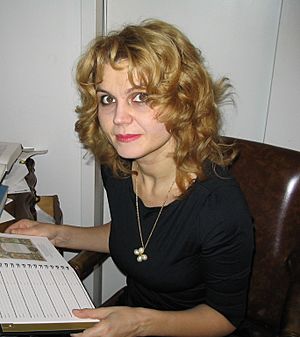Iulia Motoc facts for kids
Quick facts for kids
Iulia Antoanella Motoc
KSR
|
|
|---|---|

Motoc in 2013
|
|
| Judge of the International Criminal Court | |
| Assumed office 11 March 2024 |
|
| Nominated by | Romania |
| Appointed by | Assembly of States Parties |
| Judge at the European Court of Human Rights | |
| In office 18 December 2013 – 2 July 2023 |
|
| Nominated by | Parliamentary Assembly of the Council of Europe |
| Preceded by | Corneliu Birsan |
| Succeeded by | Sebastian Rădulețu |
| Judge at the Constitutional Court of Romania | |
| In office 15 June 2010 – 17 December 2013 |
|
| Succeeded by | Toni Greblă |
| Personal details | |
| Born | 20 August 1967 Timișoara, Romania |
| Spouse | Mihnea Motoc |
| Children | Luca-Mihnea Motoc |
| Occupation | Judge at European Court of Human Rights, professor and lawyer |
Iulia Antoanella Motoc (born on August 20, 1967) is a Romanian judge and expert in international law. She is currently a judge at the International Criminal Court (ICC). She is the first judge from Romania to be elected to this important court.
Before joining the ICC, she worked as a judge at the European Court of Human Rights. She was also a professor at the University of Bucharest and a judge at the Constitutional Court of Romania.
Ms. Motoc served as a UN Special Rapporteur for the Democratic Republic of the Congo. She also led several international expert groups and was the Vice-President of the UN Human Rights Committee. In 2013, the Parliamentary Assembly of the Council of Europe chose her to be a judge at the European Court of Human Rights for Romania. Her nine-year term started in December 2013.
In August 2021, she became the first Romanian to be chosen as a member of the Institut de Droit International. This is a group of top international law experts. In March 2023, the Romanian government selected her as their candidate for a judge position at the International Criminal Court.
Iulia Motoc is an expert in public international law. She writes about how international law works, the use of force, and human rights. She taught a special course at The Hague Academy of International Law in 2024.
Contents
Early Life and Education
Iulia Motoc was born in Timișoara, Romania. She studied law at the University of Bucharest. She earned a master's degree from the Paul Cézanne University in France in 1991. She also received a doctorate in international law from the same university in 1996.
Later, she earned another doctorate in ethics from the University of Bucharest in 1999. Her doctoral work focused on how the UN Security Council interprets rules about using force. She also studied at important universities like New York University and Yale Law School.
Career Highlights
Working in Romania
Iulia Motoc started her career in Romania as a prosecutor and judge from 1989 to 1995. In 1996, she became a lawyer in Bucharest. After that, she joined the University of Bucharest as a teacher and became a full professor in 2002.
From 2007 to 2008, she was part of a special commission that looked at Romania's Constitution. She helped write the section on human rights. In 2010, she was elected as a judge at the Constitutional Court of Romania. She worked there until late 2013, when she became a judge at the European Court of Human Rights.
International Work with the UN
Iulia Motoc became involved with the United Nations (UN) in 1996. She was a member of the UN Subcommission on Human Rights. From 2000 to 2001, she served as its president. She helped write important UN documents, including guidelines for indigenous people and for fighting extreme poverty.
She was also the UN Special Rapporteur on Human Rights and the Human Genome from 2004 to 2007. This role involved writing the first UN reports on genetics. From 2001 to 2004, she was the UN Special Rapporteur for the Democratic Republic of Congo. During this time, she visited the country and reported on serious human rights problems.
She was also a member of the Advisory Committee for the Protection of National Minorities. From 2010 to 2012, she was part of the Fundamental Rights Agency of the European Union.
Teaching and Research
Since 2002, Iulia Motoc has been a Professor of International Law and European Law at the University of Bucharest. She directed a European Master's program on Human Rights and Democratization. She also taught at New York University School of Law and St-Thomas University in Miami.
She has been a research professor at the Institute for Research in International and European Law in Sorbonne. At the European Court of Human Rights, she created a group focused on international law. She also helped organize conferences between the European Society of International Law and the European Court of Human Rights.
European Court of Human Rights
Iulia Motoc began her term as a judge at the European Court of Human Rights on December 18, 2013. In 2022, her opinion on a case called N. v. Romania was recognized as the best separate opinion of 2021 by a group called Strasbourg Observers.
In her opinion, Judge Motoc argued that the court should have looked more closely at discrimination against people with mental disabilities. She stressed that human rights are often overlooked for those with mental health issues. She believed these individuals are very vulnerable to human rights violations.
International Criminal Court
Iulia Motoc is currently a judge at the International Criminal Court (ICC). She is the presiding judge for a pre-trial chamber in the case involving Rodrigo Duterte. In October 2024, she stepped down from a three-judge panel she was leading due to health reasons.
Selected Publications
Iulia Motoc has written many books and articles on international law and human rights. Some of her works include:
- Migration and the European Convention on Human Rights (co-edited with Ledi Bianku and Basak Cali), published in 2020.
- The ECHR and General International Law (co-edited with Anne van Aaken), published in 2018.
- The impact of the European Court of Human Rights and the case-law of democratic change and development in Eastern Europe (edited with Ineta Ziemele), published in 2016.
- Women's rights as human rights from universal to regional, published in 2009.
- Pleading for Human Rights, published in 2008.
Honors and Awards
- National Order "Star of Romania" (Knight rank)
- Order of Saints Constantine and Helena
- Certificate of Honor from the Minister of Foreign Affairs of Japan
Personal Life
Iulia Antoanella Motoc is married to Mihnea Motoc, who used to be Romania's Minister of Defense. They have a son named Luca-Mihnea Motoc.
In her free time, she enjoys writing. In late 2020, she published a short fiction novel called "Maria Și Machiavelli."
See also


